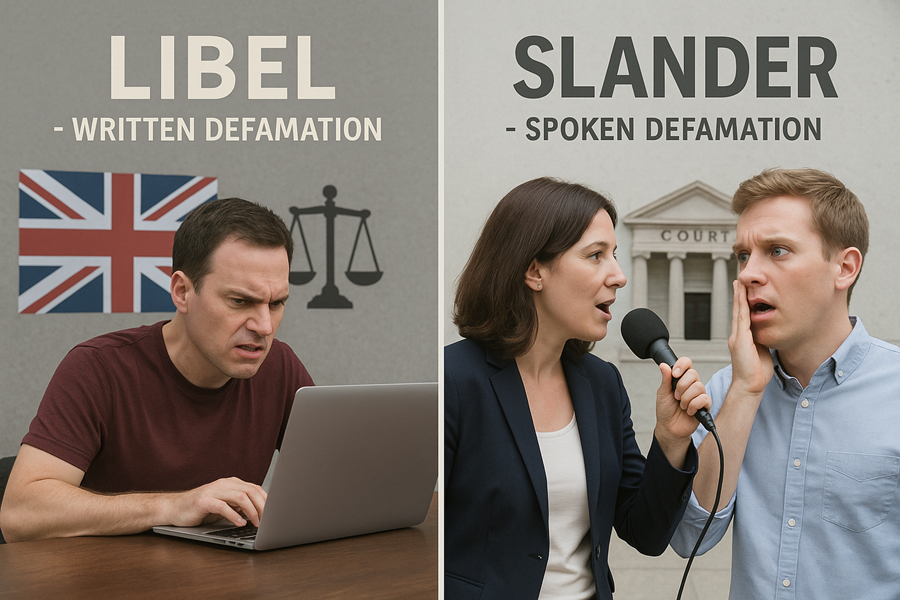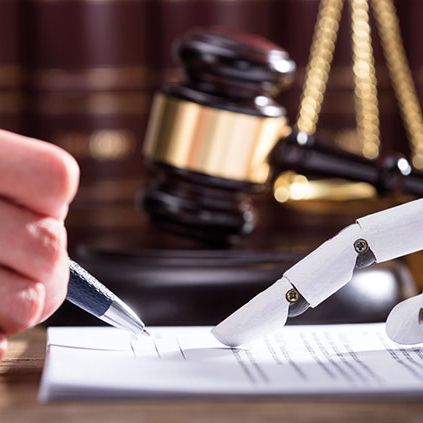Libel vs slander: What’s the difference under UK law?

False statements about you can destroy relationships, careers, and businesses. When someone publishes lies that damage your reputation, UK law offers protection through defamation claims, but the path to justice depends entirely on whether those lies were written or spoken. This difference between libel and slander affects everything from what you must prove in court to the compensation you can claim. Consult a solicitor specialising in defamation and media law for expert guidance.

KEY TAKEAWAY: Does it matter if defamation is written or spoken?
Read on to learn which category your case falls into and how it affects your compensation prospects.
Defining defamation: The foundation of UK defamation law
Defamation strikes at the heart of your reputation; but not every nasty comment qualifies for legal action. UK law sets strict boundaries around what constitutes actionable harm to your standing in society.
For a statement to be defamatory, it must satisfy three core requirements:
- The statement lowers your reputation: It must cause right-thinking people to think less of you, avoid you, or treat you with contempt.
- It refers to you specifically: Others must reasonably identify you as the target, whether named directly or through description.
- It was published to a third party: At least one other person besides you and the defamer must have seen or heard it.
The law distinguishes between mere insults and reputation-damaging falsehoods. Calling someone “annoying” rarely qualifies, but falsely labelling them a “criminal” destroys credibility. Context determines everything; the same words can be defamatory in one situation but harmless banter in another.
What is libel? Written defamation explained
Libel covers defamatory statements in permanent form, and in today’s digital world, that’s almost everything you see online. The law treats written defamation more seriously because it spreads further, lasts longer, and causes greater harm than fleeting spoken words.
Libel encompasses any defamatory statement that exists in permanent or semi-permanent form:
- Written documents: Letters, emails, reports, contracts, and official correspondence.
- Video content: YouTube videos, TikTok posts, and livestreams create lasting records.
- Digital content: Social media posts, website articles, blog comments, and online reviews.
- Audio recordings: Podcasts, voicemails, and recorded interviews preserve spoken words permanently.
- Visual materials: Photographs, cartoons, memes, and doctored images that convey defamatory meaning.
Common libel examples include:
- False accusations of criminal activity on Facebook.
- Defamatory newspaper articles or online news stories.
- Doctored photographs suggesting inappropriate behaviour.
- Fake negative reviews claiming dishonest business practices.
- WhatsApp messages falsely claiming someone has a contagious disease.
The permanence factor makes libel particularly damaging. Written lies can resurface years later, continuing to harm your reputation long after spoken rumours fade from memory.
What is slander? Spoken defamation and special categories
Slander involves defamatory statements made in temporary form, typically spoken words that disappear the moment they’re uttered. UK law recognises that whilst most slander requires proving actual harm, certain categories are so inherently damaging that they warrant automatic protection.
Slander covers defamatory statements communicated through temporary means:
- Sign language: Defamatory communications through visual-manual modality.
- Gestures and mimicry: Actions that convey defamatory meaning without words.
- Temporary displays: Skywriting, sand drawings, or other fleeting visual messages.
- Verbal statements: Face-to-face conversations, telephone calls, and casual remarks.
- Live broadcasts: Radio programmes, live television, and unrecorded streaming content.
UK law also recognises four exceptional slander categories that receive heightened protection:
- Imputation of unchastity: Making false statements about sexual impropriety or moral character.
- Imputation of contagious disease: Claiming someone suffers from diseases that would cause social avoidance.
- Imputation of criminal offences: Falsely accusing someone of committing crimes punishable by imprisonment.
- Imputation of unfitness for office, profession, or trade: False claims questioning professional competence or integrity.
These categories exist because UK law acknowledges their devastating impact on reputation, regardless of whether immediate harm can be demonstrated.
Libel vs Slander: The critical difference in damages
The crucial difference between libel and slander lies in what you must prove to win compensation. This distinction can determine whether your case succeeds or fails before you even reach court.
Libel: Damages presumed
Libel enjoys a significant advantage in UK law:
- Exemplary damages in rare cases: Punitive awards to deter future misconduct.
- No proof of harm required: Damages are presumed once defamation is established.
- Aggravated damages possible: Additional awards for particularly malicious conduct.
- Injunctive relief readily granted: Courts more willing to stop ongoing written defamation.
- General damages available: Compensation for injury to reputation, feelings, and standing.
Slander: Special damage must be proved
Slander faces much higher hurdles unless it falls within special categories:
- Future losses difficult to recover: Speculative harm rarely compensates.
- Causation must be clear: Direct link between spoken words and your losses.
- Actual financial loss required: You must demonstrate measurable economic harm.
- Medical expenses may qualify: Costs arising from stress-related illness caused by defamation.
- Documentary evidence essential: Contracts lost, employment terminated, or business declined.
The four special slander categories escape these restrictive rules and receive the same presumed damage treatment as libel, recognising their inherently harmful nature.
Social media: Blurring the lines between written and spoken defamation
Social media has revolutionised how we communicate, and created complex challenges for defamation meaning in the digital age. UK courts must now decide whether fleeting online content constitutes permanent libel or temporary slander, with significant implications for your legal remedies.
The digital dilemma
Modern social media platforms challenge traditional libel and slander boundaries:
- Voice messages: WhatsApp voice notes and Telegram audio clips.
- Disappearing messages: Signal, Telegram, and WhatsApp’s vanishing content.
- Clubhouse conversations: Audio-only social networking with no permanent record.
- Instagram stories and Snapchat: Temporary content that disappears after 24 hours.
- Live streaming platforms: Real-time broadcasts on Facebook Live, Instagram Live, and TikTok.
How UK courts classify digital content
The law generally applies these principles to social media defamation:
- Deleted posts: Remain libel if screenshots or archives exist.
- Temporary stories with screenshots: Become libel once captured permanently.
- Voice messages: Usually classified as libel because they’re stored and retrievable.
- Posted text and images: Almost always treated as libel due to their recorded nature.
- Live broadcasts without recording: May constitute slander as they lack permanence.
The permanence test: Courts consider whether defamatory content can be retrieved, shared, or referenced later. Even temporary publication becomes libel if someone preserves it through screenshots, recordings, or digital archives.
Do I need a solicitor for defamation claims?
Defamation cases are among the most complex areas of UK law. Attempting to navigate them alone often results in missed deadlines, inadequate evidence, and lost opportunities for compensation. Professional legal representation isn’t just advisable; it’s essential for success.
- Expert case assessment: Experienced defamation solicitors quickly identify whether your claim has merit and the likely compensation range.
- Strategic litigation planning: They’ll determine the most effective approach, whether pursuing urgent injunctions to stop ongoing harm or focusing on maximum damages.
- Evidence gathering expertise: Professional teams know how to preserve digital evidence, obtain witness statements, and build compelling cases before defendants can delete damaging content.
- Negotiation advantage: Most defamation cases settle out of court; specialist solicitors achieve significantly better settlements through strategic negotiation and litigation pressure.
FAQs
Can I sue for defamation if the statement is true?
Truth is an absolute defence to defamation claims. Even if a true statement damages your reputation, UK law protects the right to publish factually accurate information.
How much compensation can I claim for libel or slander?
Awards vary dramatically based on your reputation, the statement’s severity, and circulation. Recent cases range from £3,000 for minor online posts to over £100,000 for serious allegations in national media.
What if the defamatory statement was made abroad but published online in the UK?
UK courts may have jurisdiction if the statement caused substantial harm to your reputation in England and Wales. However, enforcement against foreign defendants presents significant practical challenges.
Can I be sued for sharing or retweeting someone else’s defamatory post?
Sharing, retweeting, or reposting defamatory content makes you a publication party. You face the same liability as the original author, regardless of whether you added your own comments.
The difference between libel and slander determines whether you walk away with compensation or empty-handed. Don’t let technicalities destroy your chance at justice; understanding these distinctions protects your reputation and your rights.
Stop the lies!
Qredible’s expert defamation solicitors turn reputation attacks into compensation victories.
KEY TAKEAWAYS:
- Libel covers permanent written defamation while slander involves temporary spoken statements, with this fundamental difference determining your legal strategy and potential compensation.
- Libel claims automatically presume damages without requiring proof of financial loss, whereas slander typically demands evidence of actual economic harm to succeed in court.
- Four special slander categories, criminal accusations, contagious disease claims, unchastity allegations, and professional unfitness, receive the same protective treatment as libel under UK law.
Articles Sources
- netlawman.co.uk - https://www.netlawman.co.uk/ia/defamation
- araglaw.co.uk - https://www.araglaw.co.uk/blog/libel-and-slander-the-distinction-in-defamation-/
- capitallaw.co.uk - https://www.capitallaw.co.uk/news/defamation-the-difference-between-libel-and-slander/
Do you need a solicitor?
Find a solicitor on Qredible in just a few easy steps

















